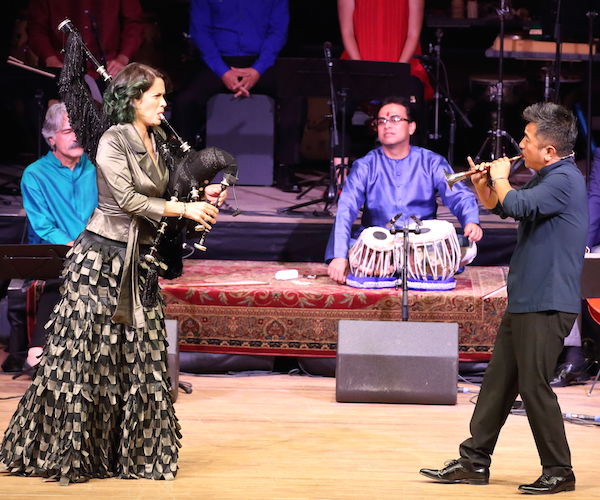Music Review: Yo-Yo Ma and the Silk Road Ensemble at Tanglewood – Global Adoration
If there is such a thing as world music, this is it.
Yo-Yo Ma and the Silk Road Ensemble at Tanglewood on August 7.

Gaita player Cristina Pato and bawu player Wu Tong collaborate during the Silk Road Ensemble performance at Tanglewood. Photo: Hilary Scott.
By Glenn Rifkin
When the legendary virtuoso Yo-Yo Ma takes the stage at any venue around the world, he is a riveting, charismatic presence. But when Yo-Yo performed at Tanglewood on Sunday night as part of his brainchild The Silk Road Ensemble, he was just the old guy in a suit playing the cello. Though that description may be exaggerated (his presence in a queue at Starbucks would not go unnoticed) Yo-Yo’s unobtrusiveness was purposeful. This night wasn’t about him, it was about the power of music to cross borders, ideologies, and daunting cultural barriers and trigger a dynamic, emotional connection with an adoring audience.
The 16 musicians surrounding Yo-Yo are virtuosos in their own right and their mission is to weave together the music from their native lands in search of an open exchange of ideas, beliefs, and understanding. The Silk Road Ensemble is the visible manifestation of Silkroad, an organization Yo-Yo Ma founded 18 years ago in an effort to connect the world through the arts.
The ensemble returned to the stage at the Koussevitzky Shed in an evening appropriately dubbed “Going Home.” Before a sold-out enthusiastic crowd on a picture-perfect summer evening, Silk Road did not disappoint, not even close.
No doubt many in the crowd had just seen the recently released documentary The Music of Strangers: Yo-Yo Ma and the Silk Road Ensemble (currently screening at the West Newton Cinema) from Oscar-winning director Morgan Neville (20 Feet From Stardom). For those who had seen the film, a chance to witness the ensemble live and in person was special. And on this evening, on the stage where the ensemble first performed together in 2000, there was a marked sense of return.
These musicians are not just skilled, they are distinct charismatic personalities representing lands along the famed Silk Road. If there is such a thing as world music, this is it. The evening started with a stunning duet by Cristina Pato, a vivacious Spaniard from the Galicia region, and Wu Tong, from China. Pato performed on her signature gaita or Galician bagpipes while Wu played the suona, a Chinese horn. They moved slowly across the stage towards each other as a metaphor for the coming together of Europe and Asia. The reaction from the crowd was raucous, but it was the faces of members of the ensemble, pleased and awed by their compatriots, that stood out.
A rousing rendition of “Ichichila,” arranged by Shane Shanahan, followed, and it took a traditional Tuareg sound from West Africa and made it feel almost like a Celtic reel, while an actual traditional Irish number, “O’Neill’s Cavalry March,” echoed the sentiment. As the evening progressed, every player and every instrument was featured in memorable riveting fashion. The petite Wu Man played “Green (Vincent’s Tune)” on the pipa in honor of her now 18-year old son — a fact that Yo-Yo Ma pointed out to illustrate how long the group has been together. The pipa, a four-stringed Chinese lute, might seem the most unlikely instrument to fit seamlessly among these bold offerings, but in Wu’s remarkable hands, the plucking and strumming of her flying fingers highlighted the evening.

Tabla player Sandeep Das and cellists Yo-Yo Ma and Eric Jacobsen performing at the Koussevitzky Music Shed. Photo: Hilary Scott.
Yo-Yo offered a brief introduction for the adoring crowd, but he quickly pulled back into the ensemble and brandished his cello forcefully but quietly amid the set list. Recognizing the players from the film, the audience was in awe of such compelling stories as those of Syrian Kinan Azmeh, famed Iranian kamancheh player Kayshan Kalhor, and Wu Man, who each survived cultural and political revolutions. They put their talents on display across a variety of offerings including a stunning version of “Going Home,” a tune by Dvorak with lyrics by William Arms Fisher. Here it was translated into Chinese and sung by the multitalented Wu Tong, whose rendition was the highlight of an evening filled with such moments.
If the A Train had run along the Silk Road, it would have surely inspired the Shane Shanahan–arranged rendition of the jazz classic, made new by the unique blend of these distinctive instruments.
The evening came to a stunning ending as the fellows from the Tanglewood Music Center, on campus for a global musicians workshop, joined the ensemble on stage to perform “Wedding,” a piece written by Kinan Azmeh as a tribute to the spirit of the Syrians, who, despite the carnage of a five-year civil war, still find ways to fall in love and get married. The rousing finale pulled the roaring crowd to its feet in a sustained recognition of that tune and of an unforgettable evening of music. When the applause refused to die, Yo-Yo Ma feigned a plea to the audience through gestures that it was well past his bedtime. But for this evening, sleep was the last thing on the audience’s mind.
Glenn Rifkin is a veteran journalist and author who has covered business for many publications including The New York Times for more than 25 years. Among his books are Radical Marketing and The Ultimate Entrepreneur. His efforts as an arts critic and food writer represent a new and exciting direction.
Tagged: Cristina Pato, Tanglewood, The Silk Road Ensemble, Wu Tong
